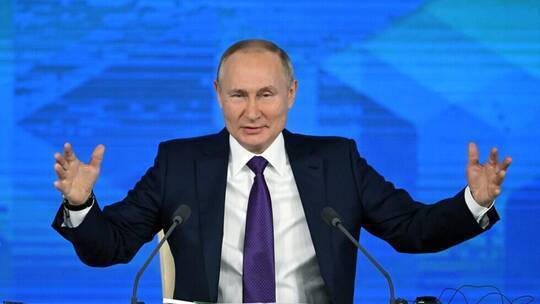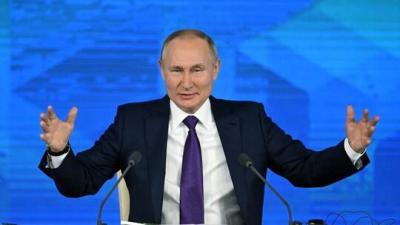As tensions rise in the Ukraine crisis, nearing the brink of war, the British newspaper "The Guardian" posed a simple question: What does Russian President Vladimir Putin want from Ukraine? The newspaper states that official spokespeople in Russia deny daily any intention from Moscow to invade Ukraine, a sentiment echoed by Putin when he received French President Emmanuel Macron last week and when he spoke by phone with U.S. President Joe Biden on Saturday. However, there are two issues with this denial: firstly, few in the Western government believe it; and secondly, Putin has not explained why he has amassed more than half of the Russian armed forces, exceeding 130,000 soldiers, on Ukraine's borders if his intentions are peaceful.
To answer the main question in the report, one must consider the following questions: What drives Putin?
There are several theories, one being that Putin wants to rebuild Russian influence in Eastern Europe, particularly in the former Soviet republics such as Estonia, Latvia, Belarus, Georgia, Lithuania, and Ukraine. "The Guardian" notes that Putin has often lamented the loss of these countries following the collapse of the Soviet Union. Putin hopes to demonstrate to the West and Russians alike that Russia remains a great power, despite being medium-sized and failing by most metrics (nuclear stockpiles and geography).
Why Ukraine?
Putin fears that strategically significant Ukraine, controlling the southwestern flank of Russia, will increasingly integrate with the West. He objects to its growing proximity to NATO and opposes Kyiv's development of ties with the European Union. Worse still from his perspective, Ukraine is a democracy, enjoying freedom of expression and a free press, in contrast to the lack of such freedoms for Russians. If Ukrainians follow their neighbors' example, Putin would likely not remain in power for long. Nostalgia for the past is part of Putin’s ideology, who views Ukraine as an integral part of historical Russia, and its loss as a defeat for Russia in the Cold War.
Why now?
Putin feels that the West has become weaker, especially after NATO's humiliation in Afghanistan last year. He also believes that U.S. President Joe Biden has launched a campaign to end wars, indicating he is not likely to engage in new ones. Putin has observed that Biden has refocused U.S. foreign policy and military resources to confront China, not Europe. Internally, Putin seeks a significant victory to bolster his domestic position, distract from rampant corruption within the system, and justify the hardships Russians face due to Western sanctions imposed after his initial attack on Ukraine in 2014.
What are Putin's demands?
To defuse the crisis, Putin seeks a commitment from the West not to accept Ukraine (or Georgia and Moldova) as NATO members forever. He also wants NATO to withdraw from countries he refers to as "facing off" against Russia, such as Poland, Romania, and Bulgaria, which were previously part of the defunct Warsaw Pact. He demands that Kyiv accept a self-governing status for the Donbas region and abandon its claims to Crimea (as part of the so-called Minsk Agreements). Furthermore, he wants to limit or halt the deployment of new U.S. intermediate-range missiles in Eastern and Southern Europe. His more ambitious goals include redesigning the "security architecture" in Europe to solidify Russian influence and expand its geopolitical reach; the U.S. response to most of these demands has been "no," which has fueled the current crisis.




